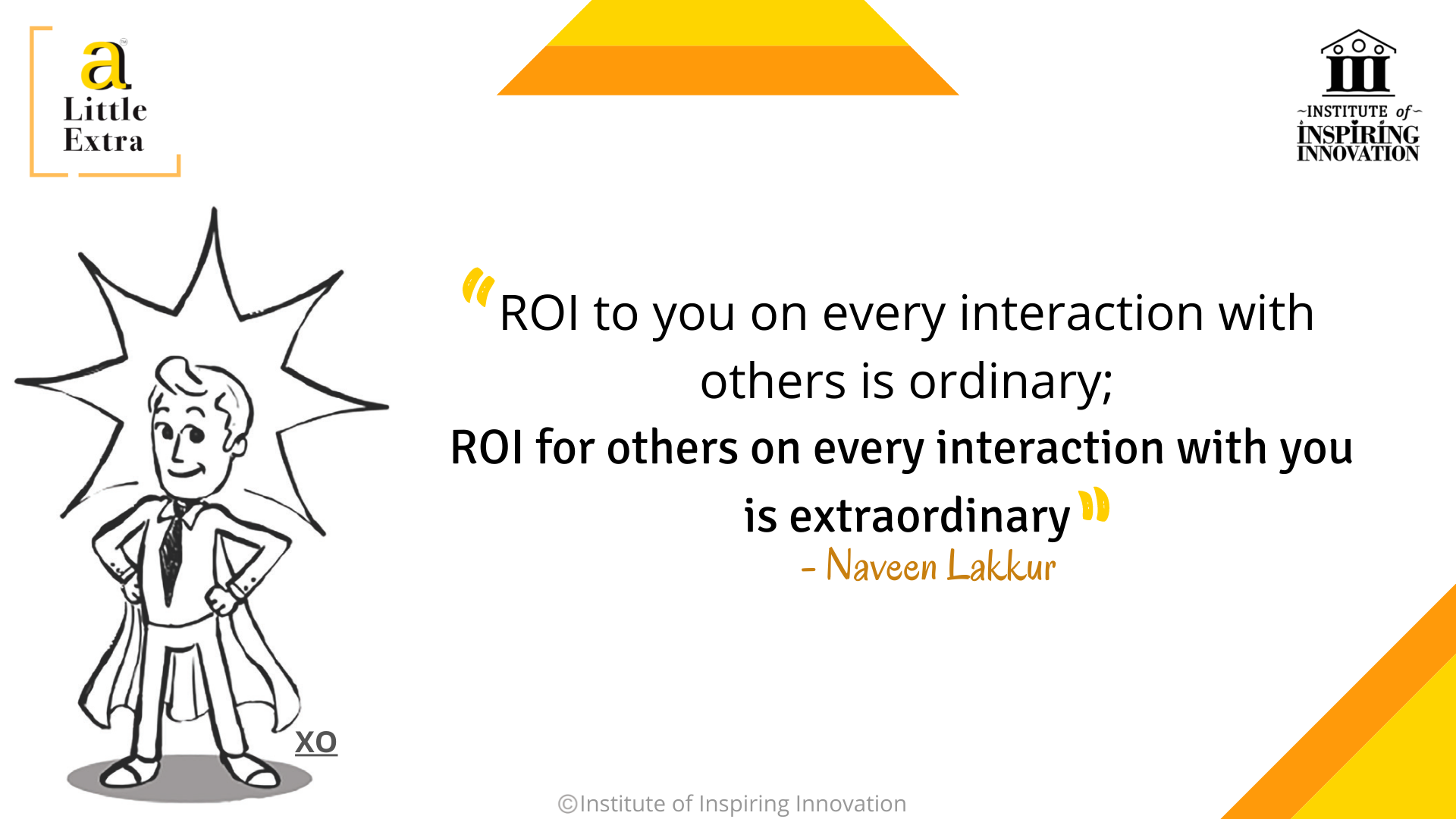eXtraOrdinary People Think of RoI for Them and for Others

“ROI to you on every interaction with others is ordinary; ROI for others on every interaction with you is extraordinary.” – Naveen Lakkur
When negotiating a deal, both the parties at the negotiating table must see the benefits of the deal, in this case, Return-on-investment (RoI). Thinking of RoI to only your company may get you short-term rewards, but you may lose in the long run. However, those who think of profit/RoI for both parties are winners in the long run.

 Indian Oil a public company is associated with the energy sector and has been successful in meeting with demands for energy in India. Nearly half of the petroleum products in India are dealt with by the Indian Oil Corporation. This dominance is carried forward to aircraft fueling in India. However, it did not do it alone.
The company formed a partnership with Skytanking GmbH, a German organization that has made a name for itself in plane-fueling, storage, and hydrant management worldwide. The company has been providing solutions to oil companies, airlines, or suppliers with engineering, operations, and financials involved in civil and defense aviation fueling.
The company born out of the deal, Indian Oil Skytanking Pvt Ltd, headquartered in Kempegowda airport in Bangalore provides aviation fuel infrastructure for airports in India. It leads in fuel farm handling in the country. The corporation is equally owned by the oil giant and Skytanking. However, it does not directly fuel aircraft.
The company plans, constructs, operates, and maintains infrastructure for fueling until an agreed-upon time and then transfer to the public sector partner that funded them. However, they are not involved in the fueling business. This is an example of generating RoI for both or multiple parties.
When negotiating a deal, both the parties at the negotiating table must see the benefits of the deal, in this case, Return-on-investment (RoI). Thinking of RoI to only your company may get you short-term rewards, but you may lose in the long run. However, those who think of profit/RoI for both parties are winners in the long run.
Indian Oil a public company is associated with the energy sector and has been successful in meeting with demands for energy in India. Nearly half of the petroleum products in India are dealt with by the Indian Oil Corporation. This dominance is carried forward to aircraft fueling in India. However, it did not do it alone.
The company formed a partnership with Skytanking GmbH, a German organization that has made a name for itself in plane-fueling, storage, and hydrant management worldwide. The company has been providing solutions to oil companies, airlines, or suppliers with engineering, operations, and financials involved in civil and defense aviation fueling.
The company born out of the deal, Indian Oil Skytanking Pvt Ltd, headquartered in Kempegowda airport in Bangalore provides aviation fuel infrastructure for airports in India. It leads in fuel farm handling in the country. The corporation is equally owned by the oil giant and Skytanking. However, it does not directly fuel aircraft.
The company plans, constructs, operates, and maintains infrastructure for fueling until an agreed-upon time and then transfer to the public sector partner that funded them. However, they are not involved in the fueling business. This is an example of generating RoI for both or multiple parties.
When negotiating a deal, both the parties at the negotiating table must see the benefits of the deal, in this case, Return-on-investment (RoI). Thinking of RoI to only your company may get you short-term rewards, but you may lose in the long run. However, those who think of profit/RoI for both parties are winners in the long run.
Story 1 – Indian Oil Generates RoI for Stakeholders

 Indian Oil a public company is associated with the energy sector and has been successful in meeting with demands for energy in India. Nearly half of the petroleum products in India are dealt with by the Indian Oil Corporation. This dominance is carried forward to aircraft fueling in India. However, it did not do it alone.
The company formed a partnership with Skytanking GmbH, a German organization that has made a name for itself in plane-fueling, storage, and hydrant management worldwide. The company has been providing solutions to oil companies, airlines, or suppliers with engineering, operations, and financials involved in civil and defense aviation fueling.
The company born out of the deal, Indian Oil Skytanking Pvt Ltd, headquartered in Kempegowda airport in Bangalore provides aviation fuel infrastructure for airports in India. It leads in fuel farm handling in the country. The corporation is equally owned by the oil giant and Skytanking. However, it does not directly fuel aircraft.
The company plans, constructs, operates, and maintains infrastructure for fueling until an agreed-upon time and then transfer to the public sector partner that funded them. However, they are not involved in the fueling business. This is an example of generating RoI for both or multiple parties.
When negotiating a deal, both the parties at the negotiating table must see the benefits of the deal, in this case, Return-on-investment (RoI). Thinking of RoI to only your company may get you short-term rewards, but you may lose in the long run. However, those who think of profit/RoI for both parties are winners in the long run.
Indian Oil a public company is associated with the energy sector and has been successful in meeting with demands for energy in India. Nearly half of the petroleum products in India are dealt with by the Indian Oil Corporation. This dominance is carried forward to aircraft fueling in India. However, it did not do it alone.
The company formed a partnership with Skytanking GmbH, a German organization that has made a name for itself in plane-fueling, storage, and hydrant management worldwide. The company has been providing solutions to oil companies, airlines, or suppliers with engineering, operations, and financials involved in civil and defense aviation fueling.
The company born out of the deal, Indian Oil Skytanking Pvt Ltd, headquartered in Kempegowda airport in Bangalore provides aviation fuel infrastructure for airports in India. It leads in fuel farm handling in the country. The corporation is equally owned by the oil giant and Skytanking. However, it does not directly fuel aircraft.
The company plans, constructs, operates, and maintains infrastructure for fueling until an agreed-upon time and then transfer to the public sector partner that funded them. However, they are not involved in the fueling business. This is an example of generating RoI for both or multiple parties.
When negotiating a deal, both the parties at the negotiating table must see the benefits of the deal, in this case, Return-on-investment (RoI). Thinking of RoI to only your company may get you short-term rewards, but you may lose in the long run. However, those who think of profit/RoI for both parties are winners in the long run. 
Leave a comment